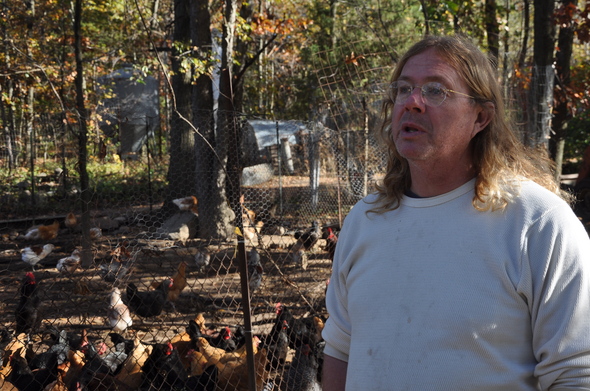Harnois Farms: our local poultry farmer working within the global world of commodities
In my Farm to Fork series, I visit local farms and share what I learn.

John Harnois on his farm.
Corinna Borden | Contributor
John Harnois, of Harnois Farms, has been raising free range, hormone-free, antibiotic-free poultry for more than 15 years. Roosters crow, turkeys gobble, ducklings peep and geese cackle - a chorus of sound and movement welcome you to his farm.
Harnois began his poultry farm in the spring of 1994.
“It has to do with knowing where your food is coming from," he said. "I wanted to know what I was eating.”
Harnois continued, “I was a city kid and so I started with chickens because chickens are cheaper. If you lose a steer, that is a big investment, but if you lose a chicken…I talked to people. I went out to visit farmers. I read books.”
As we walked around the farm, Harnois spoke easily and with knowledge about his charges, including the catch-22 implicit when raising heritage Narragansett turkeys: “You gotta eat ‘em to keep ‘em alive.”
Or an assessment of the barnyard pecking order: “Ducks are insane - that is the way they are. And they are slobs. Geese are the snobs of the barnyard, and ducks are the slobs.”
Or describing the evolution of a chicken, as he gestures to a bird with a red cape and a blue-green breast: “That’s the original chicken. All breeds of chicken come from the Red Junglefowl of India. And in India they just call them fowl.”
Harnois looked fondly at his birds, pecking and preening in the sun, and ruminated on his business model. “I have been selling a lot of meat chickens. If I can get my prices down, I can do a lot more wholesale. I want to see if I can do that.”
He paused and continued, “people want my eggs, they love my eggs. I could sell double my egg production, but I don’t have anywhere to put them - same with meat chickens. Perhaps I could figure out how to do meat chickens this winter, because no one else can do them here. Because you have to keep it at 100 degrees, you know, when they are little guys and they don’t have feathers. So it is expensive.”
Harnois two main expenses are the premium prices he pays for heritage breeds - “I think that heritage, these heirloom varieties that I have, lay a more flavorful egg” - and the food he feeds them.
All Harnois poultry - the ducks, the chickens, the laying hens, the turkeys, the geese - eat the same feed, the recipe for which he tracked down from a mill that went out of business. Harnois feels the lauded flavor of his eggs and meat is courtesy of this unique blend of grains and beans - a feed that is rapidly becoming more expensive.
“Feed just went up so much so that when I called in an order on Monday the guy called me back and said, 'Just so you know, soybeans went over $11 a bushel, and I’m telling you because you need to price your eggs accordingly.'”
Harnois continued with a quiet voice, “So at market yesterday, that was what everyone who had eggs was talking about. I think corn is going up [too].”
When we spoke Oct. 14, the price of soybean futures was $11 a barrel. At that time, the Wall Street Journal reported the corn and soybean markets were fueled by a USDA report, “that issued sharper-than-expected reductions in estimates for corn and soybean crops and ending stocks for next year, while also saying demand for the commodities remains strong.”
Some argue the demand for U.S. soy is due to traders purchasing domestic soy to sell on the more lucrative Chinese markets. “China will increase imports by 23 percent this year, partly to feed hogs as pork consumption rises,” reported Bloomberg.
On Nov. 2, Bloomberg reported that due to a high rainfall in South America, the price for soybeans “leveled off” at $12.34 a bushel and $5.9075 for corn. According to USDA data, compared with last year, the price of soybeans this year has increased by 26 percent (from $9.76) and corn by 49 percent (from $3.95).
As Harnois shared, “It is grand if you’re a cash crop farmer because they’ll get more, but then their inputs are going to go up, too - if more people start growing corn then it means that they’re gonna do less rotation of crops - that is not a good thing.”
At the end of the day, this global marketplace is setting the price of feed for the ducks, chickens, geese and turkeys that scratch, peck, preen and gobble on Harnois farm. As the price of feed rises, so does the price of eggs and meat - as Thomas Friedman says, it is a flat world.
John Harnois attends the Ann Arbor Farmers Market which will give you your chance to talk to him about duck eggs, chicken eggs, succulent chicken, tender turkeys, etc. His chicken eggs are sold at the People’s Food Co-op and his meat and eggs are sold at Arbor Farms Market. Café Zola sources 90 dozen Harnois eggs a week, and Grange Kitchen & Bar often sources meat from his birds.
John Harnois can be reached at 734-645-0300 or harnoishappyhens@gmail.com.
Corinna wrote a book about many things, works with the Westside Farmers Market, and spoils her backyard chickens.

